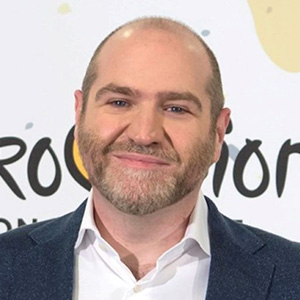Trust and Trump dominate first day of 2016 News Xchange
30 November 2016Post-fact, trust and Trump were the main words that resonated around DR’s Koncerthuset in Copenhagen on the first day of the EBU’s annual News Xchange conference for the broadcast news industry.
Welcoming over 600 news professionals from around the world, EBU Media Director Jean Philip De Tender said that “redefining journalism is what we are going to discuss over the next two days”.
“Making news popular is not the same as making popular news. Providing news that can be understood not only by the better educated who have learned to manage their emotions but also by the other half. That is the moral duty we have. News is not only commenting on society or giving it a frame, news is a fundamental part of society.”
Donald Trump and Brexit loomed large in much of the first’s day’s debate. In one panel the BBC’s Nick Robinson and DR’s Tine Gøtzsche asked, following the votes in the UK and US in 2016, “Are we out of touch?”
Keynote speaker pro-Brexit MEP Nigel Farage warned the audience that “broadcasters need to press the reset button. You have to be more responsible and more representative. You’re probably talking to less than half the population.”
“Immigration, radical Islam, climate change – these are areas where you’re losing touch with vast swathes of your population,” he continued. “You have to change otherwise you’ll come back here in 5-years’ time and they’ll be fewer of you.”
His fellow panellist Jon Williams from ABC News accepted things had to change but confronted Farage on statements he made about refugees arguing they were factually inaccurate: “A different era requires a different way for us to do our jobs – the secret might be to double down on journalism – go out and talk to people and hold others to account.”
How to restore trust in the media was also debated. “We should look at it on an ideological level”, said Turkish writer and journalist Ece Temelkuran. “We should take the discussion further,” she argued “It’s an ideological war – it’s about a clash of systematic values.”
Hindustan Times journalist Yusuf Omar told the News Xchange that traditional media was losing audiences and trust to social media because it just wasn’t responsive enough to the way audiences were thinking.
“The Trump result was obvious and all over social media,” he said. “The top five most shared stories on Facebook the week of the election were right leaning. Vote Trump was googled more than Hillary. If you didn’t see this play out you’re looking in the wrong places.”
He advocated the mobile phone as the best tool to reach audiences. “The future of journalism is selfie journalism – it's raw – it’s the device we have the most access to – it's hyper local - it’s our atomic agent of change. Make journalism great again by listening to the audience.”
“The Trump Effect” was debated by a panel which included right leaning Breitbart News journalist Matt Boyle and Amy Goodman, from Democracy Now!, on the left.
Goodman said the corporate media had “served as Trump’s red carpet”.
“All the networks became Trump TV – you had the candidate himself framing the narrative cabled into everyone’s home. It’s unacceptable that the media served as a platform for one candidate.”
Boyle said that there was “barely any coverage of issues in the mainstream media – it was a personality battle. Breibart reported the election as a race against change.”
“It wasn’t shocking to us about Trump or Brexit,” he added. “We approached it without the contempt other people in the media have for Trump. When you try to claim you’re objective when there are multiple levels of bias it’s not the way forward.”
Sarah Kendzior, a journalist and author from Missouri, offered a different perspective on how the media can regain audience trust.
“A good way to remedy trust in news is to build up local organisations to stop this stereotypical reporting of voters in the future.”
“Rhetoric matters – what matters is who gets hurt, Kendzior added. “The obligation of journalists is to serve the public. Right now journalists are not doing their job - standing up for vulnerable citizens which is what their priority should be.”
Watch highlights from day one in the video above and on the News Xchange Facebook page. During the first day the event hashtag #NX16 trended in Denmark, Switzerland and the United Kingdom among other countries.
The conversation continues on day two with, among other sessions, a look at digital’s next frontiers and a keynote on Storytelling and Committed Accountability from the Spotlight Team at The Boston Globe.
Relevant links and documents
Contact

Dave Goodman
Digital and Communications Manager - Eurovision Song Contest and Junior Eurovision Song Contest

